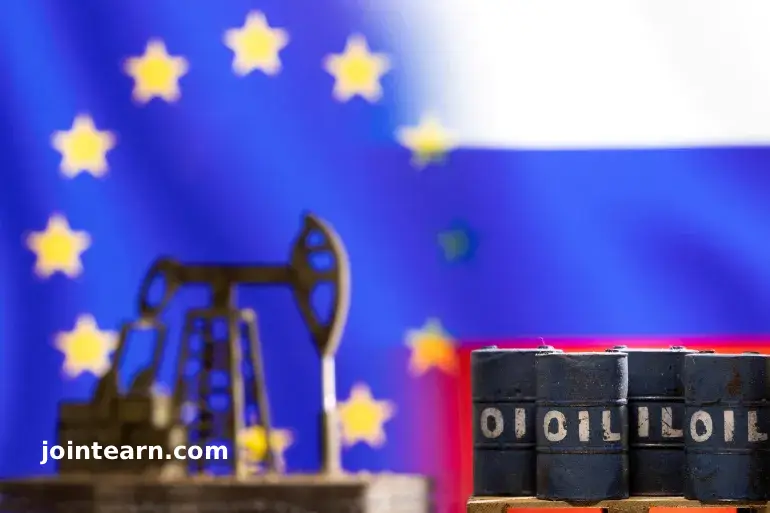
The European Union has taken a decisive step toward ending its long-standing dependence on Russian fossil fuels, agreeing to ban all Russian oil and gas imports by January 2028. The measure, approved by a majority of EU energy ministers on Monday, represents one of the bloc’s boldest responses yet to Moscow’s ongoing war in Ukraine.
A Historic Break from Russian Energy
Meeting in Luxembourg, EU energy ministers endorsed a draft regulation that sets out a phased timeline for cutting off Russian energy imports. The plan covers both pipeline oil and liquefied natural gas (LNG) — two of the main channels through which Russia has historically supplied Europe.
Under the new framework:
- No new Russian gas import contracts may be signed after January 2026.
- Existing short-term contracts must end by June 2026.
- All long-term import contracts will be terminated by January 2028.
The draft regulation will now move to the European Parliament, where it is widely expected to pass, given the political momentum toward full energy independence from Moscow.
“This is a crucial step in freeing Europe from Russia’s energy grip,” said Lars Aagaard, Denmark’s energy minister and current holder of the EU’s rotating presidency. “Although we have come a long way since 2022, we are not there yet — but this regulation brings us much closer.”
Why the Ban Matters
For decades, Russia was Europe’s largest energy supplier, accounting for more than 40 percent of the EU’s gas imports before the February 2022 invasion of Ukraine. Since then, the bloc has imposed multiple rounds of sanctions, cut reliance on Russian pipelines, and diversified its imports to include suppliers such as Norway, the United States, and Qatar.
However, Russian gas still represents about 13 percent of the EU’s total imports — roughly €15 billion ($17.5 billion) annually — according to data from the European Council.
By eliminating these imports by 2028, the EU hopes to close what leaders describe as a financial loophole that has continued to provide Russia with revenue to sustain its war machine.
Pressure from Allies
The decision comes after repeated calls from U.S. President Donald Trump for European governments to “stop funding the war against themselves” by purchasing Russian oil and gas.
Washington has pushed for faster decoupling, arguing that Europe’s partial dependence weakens the impact of Western sanctions on Moscow. The new timeline represents a compromise between rapid disengagement and the need to maintain energy stability for member states still heavily reliant on Russian supplies.
Resistance from Hungary and Slovakia
Not all member states supported the move. Hungary and Slovakia, both landlocked and historically dependent on Russian pipelines, voted against the measure.
“The real impact of this regulation is that our safe supply of energy in Hungary is going to be killed,” said Hungarian Foreign Minister Peter Szijjarto, calling the decision “ideological rather than practical.”
Despite their objections, the legislation passed under the EU’s weighted majority system, which only requires 15 of 27 member states representing at least 65 percent of the EU population.
To mitigate opposition, the final text includes special exemptions and “flexibility mechanisms” for landlocked countries, giving them extra time to adapt their infrastructure to alternative suppliers.
Energy Transition and Market Shifts
The EU’s move is part of its long-term Green Deal strategy, which aims to make Europe the first climate-neutral continent by 2050. Ending Russian imports not only carries geopolitical implications but also accelerates the bloc’s transition to renewable energy.
“Reducing our dependence on Russian hydrocarbons aligns with our climate goals and strengthens our strategic autonomy,” said EU Energy Commissioner Kadri Simson.
Analysts note that the ban is also reshaping global energy markets. While Europe has sharply cut purchases, Russia has pivoted to China, India, and Turkiye, which now buy the bulk of its discounted oil and gas.
According to the Centre for Research on Energy and Clean Air (CREA), these countries collectively import more than 70 percent of Russia’s fossil fuel exports, offsetting much of the revenue lost from Europe.
Sanctions Expansion on the Horizon
The energy regulation forms part of a broader sanctions package now under negotiation. EU foreign policy chief Kaja Kallas said on Monday that the bloc may move to ban Russian LNG imports even earlier, potentially as soon as January 2027.
She indicated that the sanctions package could be approved by the end of this week, further tightening economic pressure on Moscow.
“This is not just about energy; it’s about defending Europe’s sovereignty and values,” Kallas told reporters in Brussels. “Every euro spent on Russian fuel is a euro that sustains aggression in Ukraine.”
Challenges Ahead
Despite the political consensus, experts warn that logistical and economic hurdles remain. Many Central and Eastern European nations still lack the infrastructure to handle large-scale LNG imports or renewable alternatives.
“Europe will need to expand LNG terminals, interconnect pipelines, and ramp up renewable capacity to fill the gap,” said energy analyst Marta Varga of the European Policy Centre. “The success of this plan depends on investment and coordination across all 27 member states.”
The EU is already funding several new energy diversification projects, including expanded LNG terminals in Germany and the Netherlands, and cross-border interconnectors linking the Baltics to the wider European grid.
The Road to 2028
While the 2028 deadline might seem distant, EU officials stress that the timeline is designed to balance ambition with feasibility, allowing markets to adjust without triggering major price shocks.
“Energy security and affordability remain our top priorities,” Aagaard said. “We are determined to reach independence from Russian energy — but we will do it in a way that safeguards European consumers and industries.”
If approved by the European Parliament, the regulation will mark the final chapter in Europe’s decades-long reliance on Russian fossil fuels, symbolizing a major geopolitical and environmental turning point for the continent.


Leave a Reply